Previously: After hours of hacking away at the ceiling, Calio mounted the ladder up through the roof and waved a white sheet. A helicopter finally arrived with four men who came down and helped deliver his girlfriend Keisha’s baby boy. The rescuers then hauled Keisha, the infant, and Keisha’s other two sons up to the helicopter and to safety. Calio, three other buddies, and I insisted on staying…
I said to my boys, “I’m tellin’ you man, we better get back to the projects. We shoulda gone on that helicopter. Y’all shoulda followed your own minds. Let’s at least get back to the projects and higher ground, where everyone at.”
Outside, the floodwater was still up to our noses. Toppled trees and tangled wires made it impossible to paddle, so we pushed the boat we had found the previous day at an evacuated house. We passed cars that were completely submerged, others that were floating. One family got stuck trying to get to the Superdome in a Brown’s Velvet Dairy truck.
I pointed to cats meowing on a rooftop and shouted over the steady whooshing sounds, “They got more sense than we got!”
Along the way, we met a man whose roof had bust in; he told us they were sleeping in the bathtub. Another family huddled on their porch in prayer. I prayed too, with every move I made.
Beside us, dogs were trying to get help, just like all the humans. Some had the mange with scabs and patches of missing fur. They were paddling like crazy, fighting the currents for their lives. On the surface of the rushing water, bloated, lifeless bodies of little puppies floated past.
That we were in the midst of a terrifying event was further made real by signs scrawled on houses: Please help us! People Dog Cat . . . Need food! . . . GRANDMA INSIDE NEEDS DIALYSIS! . . . Bush get down here right now!
You could hear screams of people trapped in their homes. That’s when I began thinking about those I had left behind when I was released from Orleans Parish Prison only a few weeks earlier. If I were still in a cell, what would be happening to me? And with the disaster getting rougher by the minute, I didn’t even want to imagine what guys were going through in “the hole,” an underground cell—located beside the morgue—where unruly inmates were sent for fighting or other misbehavior. I knew how it was because I had been in the hole for smoking cigarettes; you weren’t supposed to smoke in the prison.
Twice a day you got one scoop of oatmeal. And you got one sandwich—that’s it. And the rats in the hole? They’re the fattest rats I’d ever seen. They crawl all over the place, and they don’t run away from you.
Being below ground, the hole would surely be flooded by now. I began thinking about my friend Smiley, who was always getting into fights, both with deputies and other inmates. He’s probably in the hole this very minute, I thought.
I also wondered about friends I had played cards and dominoes with and even a few deputies I was cool with. I used to talk to them at night about the street and what I would do if I beat the charge. I’d tell them, “I’m never comin’ back. I’m gonna find a nice job and get a new life.”
They would say, “Aw man, we heard you tell that story before.”
My biggest concern in prison was getting to the dentist or doctor. If you say you’ve got a toothache, they tell you to go lie down. It might be days before you see the nurse or doctor. Some guys went to dialysis a few times a week. We had a separate unit for those with AIDS and other serious medical conditions.I was under a lot of stress while in prison, but I had to remember to stand strong in order to survive. It was like going to war; you can’t put your head down or you’ll lose the battle.
But now, I worried that deputies would go home to their families and I wondered what would become of the those left locked in their cells. It wasn’t until after the storm that I read accounts about deputies abandoning inmates, who were still locked up without food or drinking water. I heard that some prisoners—being criminal-minded—knew how to file down toothbrushes and bush combs to make them into keys, which they used to pop the locks. Some escaped, some stayed behind to help others.
There was nothing anyone could do to rescue those behind steel doors—the guys in solitary. Some inmates suffered from conditions like diabetes and epilepsy and didn’t have their medication. Some never made it out.
Many of the prisoners left to fend for themselves—without food or drink in the rising sewage waters—were teenagers; and many of them were being held for minor violations; some hadn’t even been charged. As for me, my time in prison was sweet like cake, compared to my battle with Katrina.
(to be continued)




